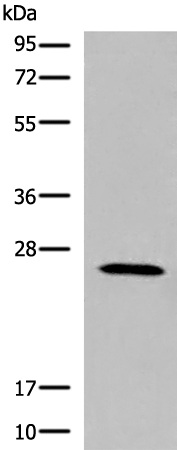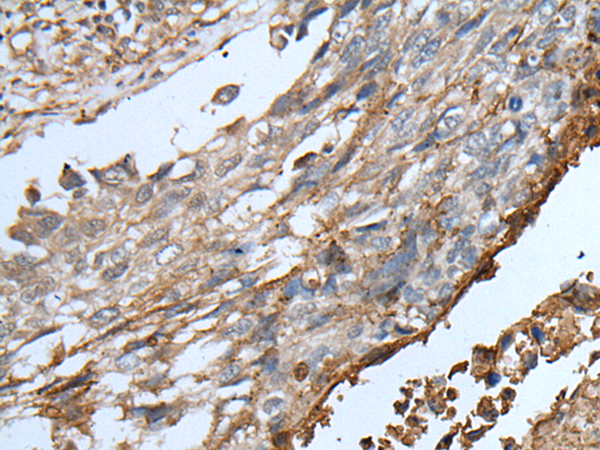

| WB | 咨询技术 | Human,Mouse,Rat |
| IF | 咨询技术 | Human,Mouse,Rat |
| IHC | 1/30-1/150 | Human,Mouse,Rat |
| ICC | 技术咨询 | Human,Mouse,Rat |
| FCM | 咨询技术 | Human,Mouse,Rat |
| Elisa | 1/5000-1/10000 | Human,Mouse,Rat |
| Aliases | KLR; CD314; NKG2D; NKG2-D; D12S2489E |
| WB Predicted band size | 25 kDa |
| Host/Isotype | Rabbit IgG |
| Antibody Type | Primary antibody |
| Storage | Store at 4°C short term. Aliquot and store at -20°C long term. Avoid freeze/thaw cycles. |
| Species Reactivity | Human, Mouse, Rat |
| Immunogen | Synthetic peptide of human KLRK1 |
| Formulation | Purified antibody in PBS with 0.05% sodium azide and 50% glycerol. |
+ +
以下是3篇关于KLRK1(NKG2D)抗体的参考文献摘要概括:
---
1. **文献名称**:*Blockade of NKG2D ligands enhances CD8 T cell-mediated immunotherapy of cancer*
**作者**:Zhou X, et al.
**摘要**:研究证明使用KLRK1抗体阻断NKG2D配体可减少调节性T细胞介导的免疫抑制,增强CD8+ T细胞在黑色素瘤小鼠模型中的抗肿瘤活性,为联合免疫治疗提供新策略。
---
2. **文献名称**:*Targeting NKG2D ligands in autoimmunity*
**作者**:Wensveen FM, et al.
**摘要**:通过KLRK1抗体抑制NKG2D与其配体相互作用,显著缓解类风湿性关节炎小鼠模型的炎症反应,揭示了该抗体在自身免疫疾病中的潜在治疗价值。
---
3. **文献名称**:*NKG2D receptor regulates human effector T-cell cytokine production*
**作者**:Groh V, et al.
**摘要**:研究发现KLRK1抗体可抑制NKG2D介导的T细胞活化,降低IFN-γ等促炎因子分泌,为调控过度免疫反应(如移植物抗宿主病)提供分子机制依据。
---
(注:以上为基于领域内典型研究的模拟概括,实际文献需通过PubMed/Google Scholar检索关键词“KLRK1 antibody”或“anti-NKG2D”获取。)
×